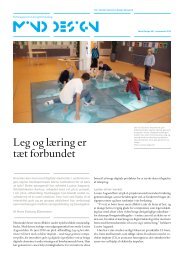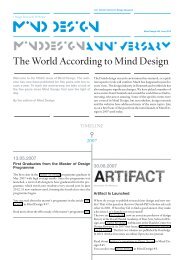Play-Persona: Modeling Player Behaviour in Computer Games
Play-Persona: Modeling Player Behaviour in Computer Games
Play-Persona: Modeling Player Behaviour in Computer Games
You also want an ePaper? Increase the reach of your titles
YUMPU automatically turns print PDFs into web optimized ePapers that Google loves.
6. The player constructs knowledge (reflective experience) with that emotion embedded, it will be<br />
remembered and used <strong>in</strong> the future to plan actions (motivational properties) at the same time<br />
emotional categories are redef<strong>in</strong>ed (re<strong>in</strong>forced or negated).<br />
Steps 5 and 6 fall <strong>in</strong>to the doma<strong>in</strong> of reflective experiences (erfahrung): the “journeyed-through”<br />
creation of knowledge.<br />
Perceptive experience is elaborated (appraised) by the player and eventually generates reflection.<br />
But not all reflections are equivalent, it is necessary to dist<strong>in</strong>guish between trivial and memorable<br />
experiences because these two k<strong>in</strong>ds of experiential knowledge affect personality <strong>in</strong> different ways.<br />
As we have seen earlier <strong>in</strong> the def<strong>in</strong>ition of the term, everyth<strong>in</strong>g seems to generate experience. So<br />
trivial perceptive experience requires a certa<strong>in</strong> amount of repetition and, iteration after iteration,<br />
eventually it creates knowledge (reflection) and changes behavioural patterns. But some<br />
perceptions are memorable <strong>in</strong> such a way that they become the icons and po<strong>in</strong>ters to precise<br />
patterns of emotional activation and behavioural response that engendered them <strong>in</strong> the first place,<br />
without requir<strong>in</strong>g iterations. These are the perceptions that generate “flashbulb memories”<br />
<strong>in</strong>dividuated by Brown and Kulik [8]. If game designers manage to successfully <strong>in</strong>corporate<br />
memorable perceptions <strong>in</strong> their games, chances are high that they will also ignite iconic reflections<br />
<strong>in</strong> players <strong>in</strong>creas<strong>in</strong>g the game’s impact on the player. I am not advocat<strong>in</strong>g the creation of games<br />
that are made exclusively of memorable perceptions but merely suggest<strong>in</strong>g that they can represent<br />
an effective shortcut and alternative to the repetition needed to convert trivial perception <strong>in</strong>to<br />
memorable reflection. For example, there can be two ways for a player to learn a new mechanic of<br />
play and therefore create knowledge: repetition of the act (trivial perception) or occurrence of an<br />
iconic, <strong>in</strong>dex<strong>in</strong>g event (memorable perception). As a concrete example we can exam<strong>in</strong>e a player<br />
be<strong>in</strong>g taught that right-click<strong>in</strong>g several times causes the avatar to run. Repetition of perceptive<br />
experience: a disembodied aid vocalizes the <strong>in</strong>structions each time the player walks. Memorable<br />
perceptive experience: a NPC is <strong>in</strong> danger and if the player doesn’t reach him <strong>in</strong> time he’ll die.<br />
Emotionally charged reflection becomes rooted <strong>in</strong> memory [8, 9] and is also remembered more<br />
often and with more clarity and detail [10, 28, 35, 27, 29].<br />
3 From reflective experience (Erfahrung) to personality<br />
In order to <strong>in</strong>vestigate how the emotionally tagged reflection can <strong>in</strong>fluence the personality it is<br />
necessary to enter the doma<strong>in</strong> of neurosciences.<br />
73















